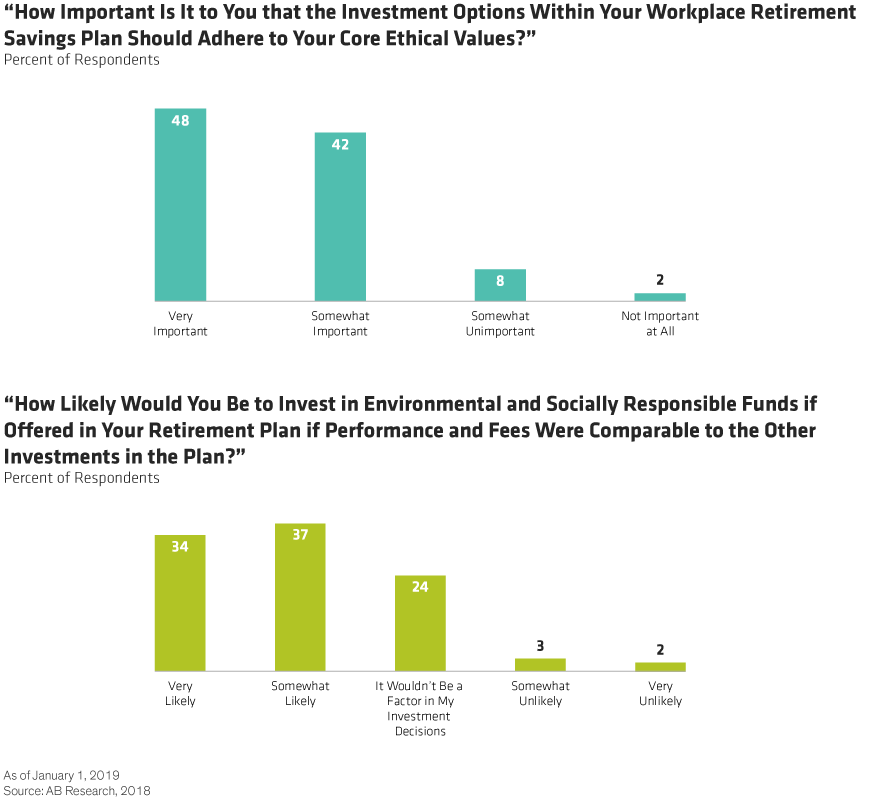by Jennifer DeLong, AllianceBernstein
In our new survey, defined contribution (DC) plan participants voice their interest in aligning their retirement investments with their ethics. But the US Department of Labor (DOL) has apparently put up some roadblocks that cause DC plan sponsors to hesitate.
New Survey, New Insights
Since 2005, we’ve been tracking the financial and emotional challenges, perspectives and trends of DC plan participants. While we ask many of the same questions each year to chart the rise or fall in attitudes toward investing, we added some new questions this year concerning participant views on responsible investing—to gauge their interest in incorporating some level of environmental, social and corporate governance (ESG) factors in their workplace retirement savings.
Our survey respondents show a strong interest, with 90% of them saying it’s important or very important that investment options in their company’s DC plan mesh with their core ethical values (Display, top). While “core ethical values” may be open to many interpretations, it allows for the inclusion of responsible investing in any form. And our respondents gave us a bit more information about their core values. Interestingly, about half say they volunteer time and almost 80% donate money to charities.
In a follow-up question, we asked our respondents if they would actively choose to invest in environmental and socially responsible funds if these were available within their company’s retirement plan (and performance and fees were comparable to those of other plan investments). Nearly three-fourths said that was likely or very likely (Display, bottom).

DOL Guidance Yields Cautions…but Clarifications
Charting ESG considerations among participants is relatively new, but their strong interest means that plan sponsors need to explore this topic further. Last year, the DOL clarified its position on the inclusion of ESG-themed investments within a DC retirement plan. The April 2018 Field Bulletin reiterated the bottom-line necessity from earlier bulletins that any investment option within a DC plan must not sacrifice financial performance potential in favor of other considerations, such as socially responsible considerations. And the face-value meaning of that would seem to add some due-diligence hurdles to many responsible investing approaches.
However, the DOL’s Field Bulletin did not categorically exclude ESG-themed approaches; and in a tie between two similar and similarly performing investment options, an ESG-themed fund or portfolio incorporating ESG considerations could certainly be included on a plan’s menu. The bulletin also noted that sometimes “collateral ESG issues” constitute intrinsic economic considerations for a company’s business plan, and should be included by a prudent fiduciary when evaluating the risks and returns. In such instances, “the weight given to those [ESG] factors should also be appropriate to the relative level of risk and return involved compared to other relevant economic factors.”
Interestingly, the 2018 Bulletin also made a distinction between ESG-themed funds and funds that incorporate ESG factors into their foundational, broad-based research and analysis of risks and returns. “For the purpose of this bulletin, ESG-themed funds (e.g., Socially Responsible Index Fund, Religious Belief Investment Fund, or Environmental and Sustainable Investment Fund), should be distinguished from non-ESG-themed investment funds in which ESG factors may be incorporated in accordance with IB 2015-01 and IB 2016-01 as one of many factors in ordinary portfolio management and shareholder engagement decisions.”
Consequently, funds that integrate these factors in their ongoing research would appear to offer plan participants a reasonable way to access responsible investing values while also providing plan sponsors and their fiduciaries a reasonable level of compliance with DOL guidelines concerning ESG investments.
What About Responsible Investing and QDIAs?
The Field Bulletin also looked specifically at the issue of ESG-themed investments as potential qualified default investment alternatives (QDIAs) for DC plans. In this instance, the DOL’s guidance states that “Nothing in the QDIA regulation suggests that fiduciaries should choose QDIAs based on collateral public policy goals.” The selection of a QDIA, such as a target-date fund, is not the same as merely offering another option within the stand-alone selections on a plan menu. QDIAs are used whenever a plan participant doesn’t actively make an investment determination, and DC plans increasingly use a QDIA in conjunction with automatic enrollment.
The problem for ESG-themed investments here is that plan sponsors and other fiduciaries for the plan might be imposing values or ethical perspectives that conflict with the views of some participants. Regardless of that, any ESG-themed target-date fund would also have to comply with earlier guidance (Field Bulletin IB 2015-01) that calls for expected risks and rates of return similar to those of available non-ESG target-date funds.
But once again, integrating responsible investing factors within a fund’s broad-based foundational research doesn’t appear in conflict with these cautions and guidelines. We believe that responsible investing should be available to plan participants. And we believe the integration of ESG factors within a fund’s underlying research is not only a good way to achieve that today; it is a crucial and necessary component of sound investment analysis.
This post originally appeared at the AllianceBernstein blog
Copyright © AllianceBernstein














